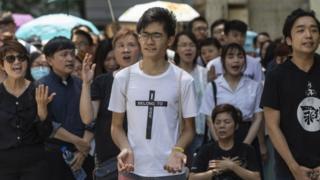Why Hong Kong protesters are singing Hallelujah
For the past two weeks, a Christian hymn has been cropping up in an unlikely place – the protests that have drawn millions of people on to the streets of Hong Kong.
“Hallelujah to the Lord” has become the unofficial anthem of crowds protesting against a controversial proposed law that would allow people accused of crimes in Hong Kong to be extradited to the mainland.
For Christians in Hong Kong, the hymn is a sign of faith but also of their concerns that it’s not only political but also religious issues that are at stake, should the bill ever pass.
Fears and uncertainty
The protests were already under way when the tune first started being sung.
But on 11 June – a day before the protests turned violent – a group of Christians holding a public prayer meeting through the night started singing Hallelujah to the Lord.
The hymn was picked up by other protesters – soon even non-Christians were singing it.
“People picked up this song as it is short and easy to remember,” Edwin Chow, 19, acting president of the Hong Kong Federation of Catholic Students, told the BBC. “There’s only one line: ‘Sing Hallelujah to the Lord’.”
The protesters said they sang it hoping it would have a calming effect on police, and would help diffuse tensions.
This was especially needed after police had earlier fired tear gas and shooting rubber bullets towards protesters.
The song also acted as a political shield, of sorts.
“According to the law, any religious assemblies in public areas are not considered as illegal, so if people sing hymns together, it could actually work as a protection and guarantee that [they] stay safe,” said Mr Chow.
“Therefore people started to sing this song to protect themselves.”
Reverend Chu Yiu-ming, one of the main Umbrella Movement leaders charged by the gov't, sings “Sing Hallelujah to the Lord” with supporters in Wan Chai. The hymn has become a symbol of peace protest over the past week.
? In coverage: https://t.co/kmLJLFCnSX pic.twitter.com/ATHQLt4o3S
End of Twitter post by @HongKongFP
After a long & emotional day, i hope this vid will bring you peace before going to bed.
These people, who don’t know each other before, have been singing the same hallelujah song for more than 18 hours in front of the police.
Again, only in #hongkong #extraditionbill #AntiELAB pic.twitter.com/Xo6TgEElOS
End of Twitter post by @jeffielam
Mr Chow said the song had spiritual meaning for Christians.
“The word Hallelujah also means to praise the Lord, so it could [also] remind Hong Kong citizens [that He] holds the future,” he said.
But the religious element to the protests have further significance.
Hong Kong has been part of China since 1997 under the “one country, two systems” principle, which means it has its own judicial independence, legislature and economic system.
But people fear that if this extradition bill passes, it would bring Hong Kong closer under China’s control. They fear it could be misused to target those that China considers dissidents.
China in theory, allows religious freedom, but it has repeatedly taken action against religious leaders it considers to be threatening to its authority or to the stability of the state.
Christians are pressured to join state-sanctioned churches led by approved priests, while some risk prosecution for worshipping in secret, underground churches.
Some in Hong Kong fear that the extradition bill could be used by China to attack religious as well as political opponents.
When the BBC asked Mr Chow if Christians in Hong Kong were afraid, he said simply “Of course”.
“There have been cases of people who [bring] Bibles to the mainland [ending up] arrested. We are very worried that once the law passes, Christians here will be affected and our freedom of religion will be suppressed.”
Hong Kong has now suspended the bill, though many are still protesting, saying they will not rest until it has been completely scrapped.
Hallelujah to the Lord was still being sung on Friday, among the thousands of people surrounding the city’s police headquarters.
So it looks like the tune is on the way to joining umbrellas as a symbol of the protesting spirit of Hong Kong.
Source: Read Full Article



